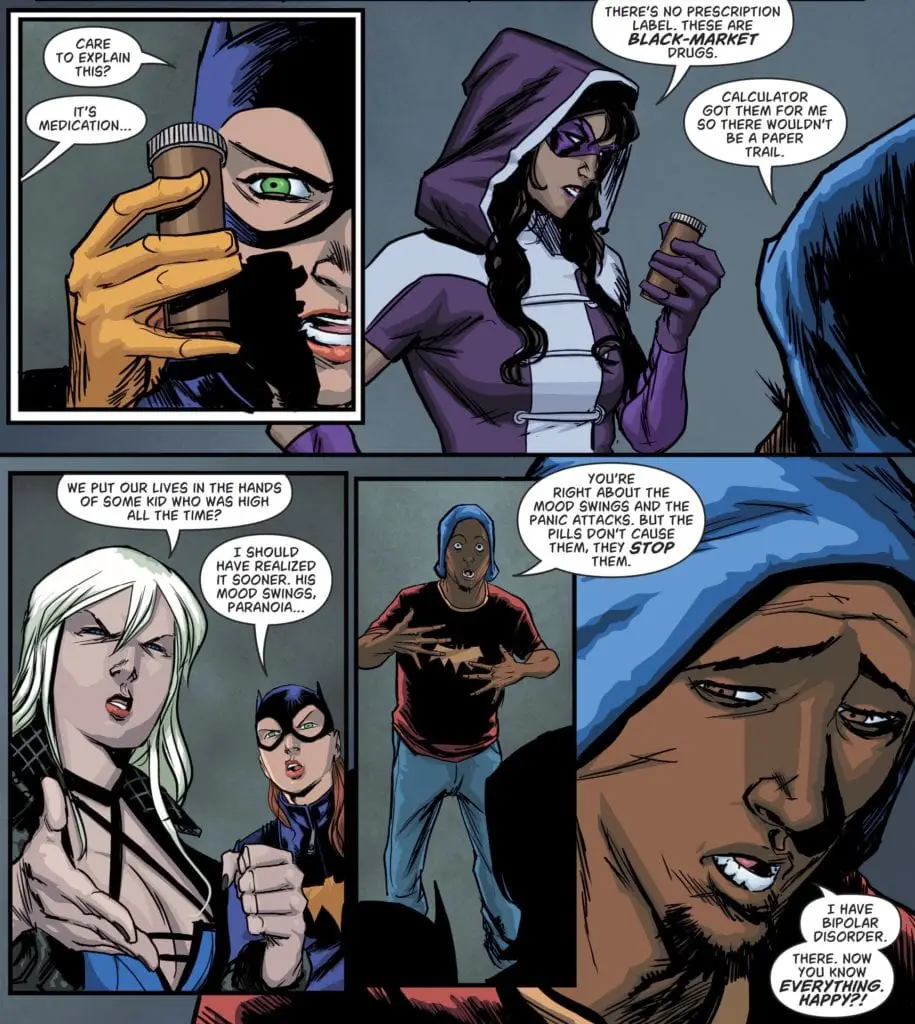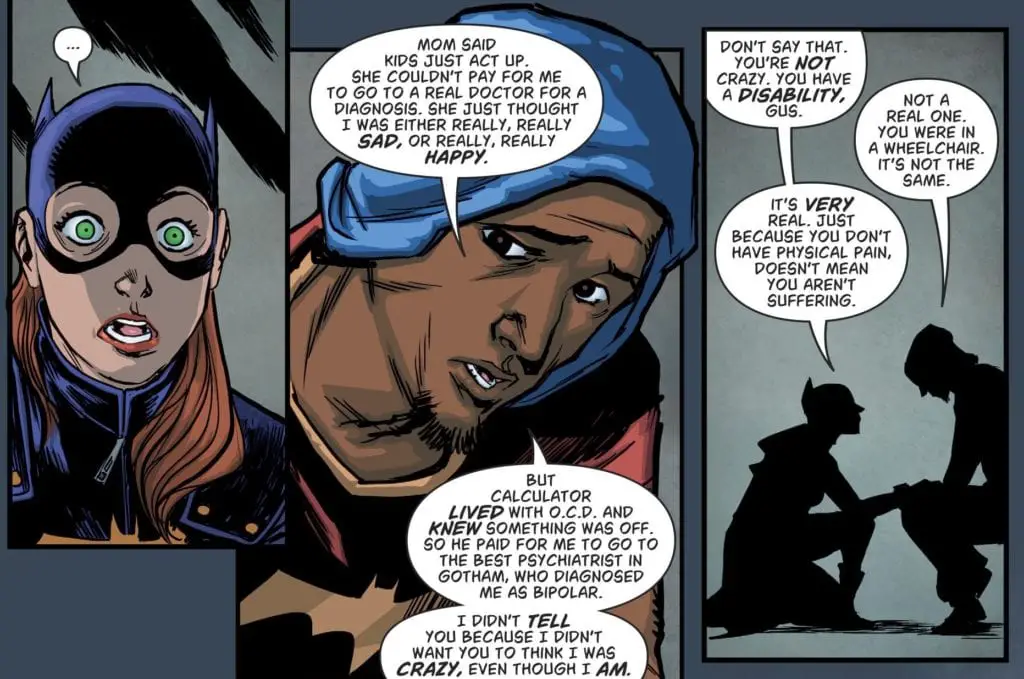
I wanted to address those things so I could move on to the meat of why what the Bensons did in this issue, and retroactively their entire run, is just so many levels of not okay. To be blunt, this is an infantilizing and grossly misrepresentative look at not only mental illness, but a fundamental lack of understanding of how one even goes about treating it. Which is, unfortunately, not exactly surprising considering how The 100, the CW show they both write for, has a rather abysmal track record on that front. Which goes the same for most other fronts, really.
I addressed Gus’s pills months ago in my review of Batgirl and the Birds of Prey #6, zeroing in on his pupil dilation, and dug even deeper into what I thought (as well as what the art itself was communicating) the Watsonian explanation the Bensons were going for in the comments section:
“…Amphetamines are stimulants for brain activity. Typically used by those with ADD, but people like to get those pills illegally because it lets neurotypical individuals focus 100%. The vast majority of engineering and pre-med students I knew in college took them regularly, and most weren’t diagnosed. Being as obsessive as Gus appears to be, and as hyper as he is, Amphetamines seems a logical conclusion. That stuff can SERIOUSLY mess you up and exacerbate the symptoms already present. Most likely, the meds have nothing to do with his double-agent stuff. Though overdosing can lead to poor impulse control and lapses in judgement, not to mention extreme tunnel vision. TL;DR it’s not the pills, but the dosage may be messing him up to the point where he is more susceptible to [forced loyalty], believing it to be a good choice rather than a bad one if the right person were to use the right words. Also, whoever is on the other end of the console may be FORCING him to up his dosage to make him…more erratic. I know a lot of people who rely on these kinds of alarm reminders for dear life, because they’d forget entirely without them. That amount of trust can be manipulated.”
The subject popped up periodically as the series went on, and as I went over last month regarding the disappointing performance of the book’s second arc, I gave the Bensons the benefit of the doubt, attributing the rather massive dip in quality and nuance to that of a mistake that every creator makes once in awhile. After all, eight issues of fantastic storytelling is not a fluke. That’s a proven pattern.
However, now I’m not so convinced, especially taking into consideration that “classic X-Men” aborted arc introduced at the beginning of Birds of Prey #8. So, let’s try and break down exactly how not okay the case of Gus Yale truly is.
“That’s Not How The Force Bipolar Disorder Works!”
What? They sneak Star Wars quotes and references in everywhere!
Anyway, after re-reading the Bensons entire year-long run of Batgirl and the Birds of Prey to make sure I was remembering things correctly, I can safely say that there is no single point in which Gus Yale exhibits behavior of someone with Bipolar Disorder. There is simply no evidence to suggest that there is Type I, Type II, Cyclothymic, or any other variation of Bipolar Disorder. And yes, there are different forms of Bipolar, so it’s rather disconcerting that neither Gus nor the Birds of Prey actually mention this at all.
The Doylist reasoning is, most likely, that the Bensons didn’t consult with anyone who has Bipolar Disorder—especially since they describe it as a disability, of which it is explicitly not—or did any thorough research of any kind. And if they did do those things, then I’m at a loss for how this even happened.
Gus’s behavior has been that of a creepy, obsessed and hyperactive stalker since the day we met him. His mood swings were bursts of irritation, not episodes (which can last for days, even weeks) of mania or depression. It is is not “sad” or “happy”. In fact, everything he did in this context was a rather honest example of over/under medicated ADD, as that can lead to, as I stated above, not-so-great behavior. Also mood swings, believe it or not. Instead of that route, though, we get this:
[tw_gallery type=”gallery,slider” height=”200″]
[/tw_gallery]
Where do I even begin? I guess word balloon by word balloon is as good a way as any. First of all, that’s not how mental healthcare in the U.S. works. That’s a needlessly complicated version of it. Remember how Gus is just rolling in cash? As in, he has enough money to launder correctly to buy entire properties, pay off an entire mortgage, and do a ton of other stuff without getting the IRS up his butt? Good, so, here’s the thing with cash: you can pay doctors in cash. It’s expensive, but you can. That’s why people have insurance. Most people don’t have that kind of money lying around to pay for medical services out of pocket, but I know of many, many psychiatrists who either don’t, or can’t, take insurance for one reason or another. So their patients pay them via cash or check.
Even if Gus couldn’t pay by cash, he has to have a checking account to be able to buy entire buildings, renovate them, help his mom with her mortgage, and donate to at least some of those charities. Even if he did it through Paypal or Venmo, you still need a bank account! And if you have that, there’s no reason not to have a checking account with that kind of money. Basically, Gus could have gone to a doctor on his own, after the Calculator told him he’s not just “acting up”, gotten diagnosed, and started taking medication that works for him on his own dollar.
Except, it doesn’t stop there. No, as it turns out, the Calculator runs a super-hippy-dippy-chill business with hundreds of employees that he insures. Read it again; Gus explicitly goes out of his way to say that these employees have insurance. And since Gus was working for him, presumably full-time (why would it not be?) that means he also had insurance. Now, it wouldn’t have paid for the “best psychiatrist in Gotham City”, but nobody realistically needs that. Any psychiatrist worth their salt can identify Bipolar Disorder. Except they wouldn’t have, because Gus doesn’t have that.
So this whole “black market” (Helena, he could have removed the label) thing only makes sense in one possible way: the Calculator paid a doctor to misdiagnose Gus so that he could mentally destroy him with the wrong kind of drug under the guise of helping him. And you know what? That would be an awesome and horrifying super-villain plot that would make perfect sense for the Calculator…
Just one problem with that, though: it’s not what happened.
The Calculator, hence the name, would not be insane enough to hire a young man, full-time, to work under his wing in his company that he was also shoving bad drugs into in the hopes that he’d break him…because he gave him assignments with real actual money on the line, millions of it, and kept doing it. This would also totally undermine the “sympathetic villain” angle the Bensons are going for, and more or less failing at, with the Calculator. Oh, and one more reason why this couldn’t be the case: Gus says the drugs are working. If he was Bipolar, and given the wrong drugs (say, Adderall), he would be seriously messed up and not really capable of any rational thought. It’d be a nightmare for him and everyone around him.
“It’s Not A Lie, If You Believe It.”
Right, now that we’ve covered the logistical impossibilities of this situation, let’s get to the rest of the rather infantilizing dialog regarding Gus’s predicament. It’s meant for us to see Gus in a new light, that he is the victim and can’t be blamed for his actions because…Bipolar. Yeah, no that’s not a “get out of jail card free” card. Even if you took the insanity plea, which you really do not want to do voluntarily, you’re not absolved of any wrongdoing. That’s not how society works, nor should it.
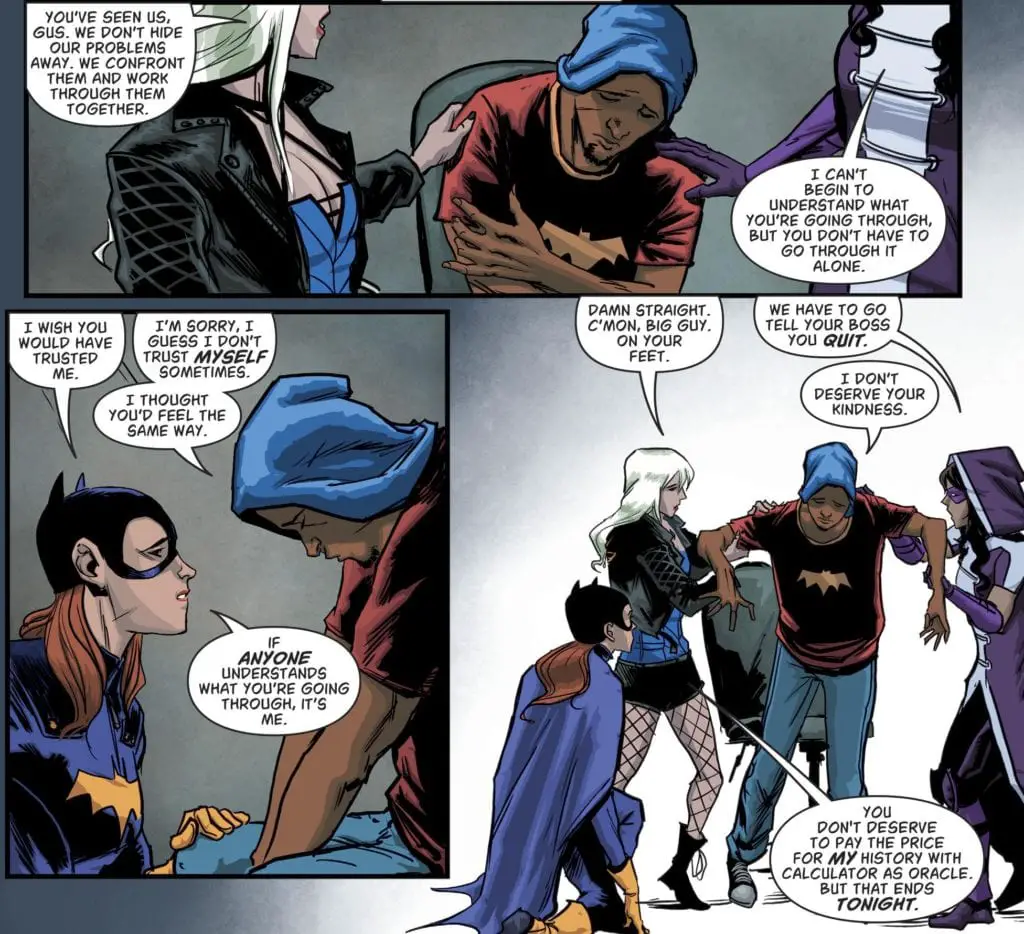
You’re right, Gus. You don’t deserve their kindness. You made bad decisions. You hurt people. You betrayed people. You got people killed. All of that is on you, not your Bipolar Disorder. Which, again, is not a disability. At all. It is no way equitable to Babs being in a wheelchair.
I understand the attempted sentiment of “just because it’s in your head, it’s not any less real”, but this is not the way to go about it. This is not how to communicate what bipolar disorder is, what the struggles are, and what those suffering from it have to deal with on a daily basis. Comparing it to being paraplegic, because it’s something you can see, just doesn’t work in this case because Babs wasn’t coerced into doing bad stuff by a supervillain because of that.
In fact, she did the opposite! This issue goes out of the way to show readers that every time the Calculator got too close to her, she quite literally beat the piss out of him!
So where does that leave us? Well, in a rather curious spot. See, there’s another character, one of our all-time favorites here at the Fandomentals, that also suffers from mental illness. If you guessed Kate Kane you’re—okay, you’re not wrong, but we’re not talking about PTSD at the moment.
No, right now we’re talking about anxiety and Jessica Cruz: the Greatest Green Lantern Of Them All. Honestly, I can’t convey just how effective and perfect Green Lanterns #15 is at showing how anxiety affects someone’s everyday life, and the way many are able to cope with it, better than the book itself, let alone Ian’s review of said issue. So I’ll quote him, or, rather, screencap him:
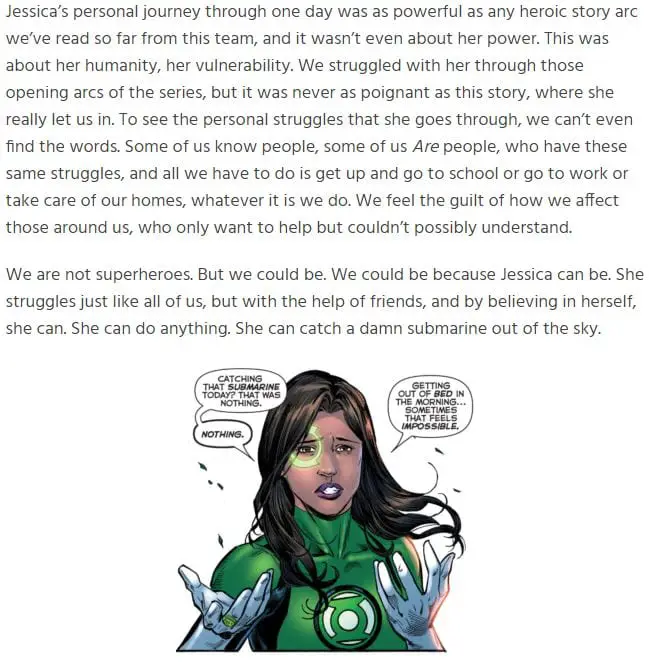
Jessica is chosen as a Green Lantern for her ability to overcome great fear. She is, as far as we know, not medicated for her anxiety, which is perfectly fine. Some choose to go that route, while others do not. It all depends on the person. With Jessica, we’re able to get a sense of the absolutely absurd amount of willpower it takes for her to, as she says above, get out of bed. And that carries over into the rest of the day, moment to moment.
But she lives her life, and does not blame her failures on her mental illness. She blames her failures on herself, and her struggle to live with her anxiety. That is the absolute key here. Where Gus whines and more or less proclaims “woe is me”, Jessica does not. The social feedback is also telling of each writer’s…commitment to accuracy and respect towards the neurodivergent.
Sam Humphries, the recently married (Mazel Tov!) author of Green Lanterns used Simon Baz’s (Jessica’s buddy cop-style partner) frustration with Jessica’s inconsistent behavior—at one point he’s confused since he thought she’d gotten better, which is not how anxiety works—as an extremely effective manifestation of what many neurotypical individuals think and feel about those they know with anxiety. It’s difficult for them to understand, since to “calm down” is not actually a thing. Nor is “stop thinking about it”. But, in the end, Simon realizes that he doesn’t need to perfectly understand why Jessica feels the way she does, or even why: he figures out that the best thing he can do is to accept her feelings as truth and do his best to support her like the awesome friend he is…which in his case meant coming over in his pyjamas and making her pancakes. Didn’t cure her anxiety, nothing ever will, but it shows he truly cares and has 100% has her back.
On the other side of the table, Julie and Shawna Benson basically just encouraged people to treat those with mental illness with the leniency of a child that is acting inappropriately and only needs a big hug to set them back on the right track. It’s not his fault he got those people murdered, or that he’s lying to them, or that he didn’t think to question how exactly the Calculator would frame him for his own crimes with literally zero idea of who this guy even was or what he was capable of. He’s just trying to do the right thing except he’s really not.
Before Babs and the Birds of Prey came along…he was still selling intel to the highest bidder. But, even more than that, there’s no indication that Gus’s Bipolar Disorder is even going to be a consistent part of his character going forward because it’s not that in the slightest. Which means that since he’s been forgiven, it won’t directly affect his behavior one way or the other aside from a brief mention or two once in awhile. Because absolving Gus for all the horrible things he did also heals his Bipolar Disorder, which is really just not a great thing to communicate, intentional or otherwise.
In Which The Birds of Prey Pass The Idiot Ball
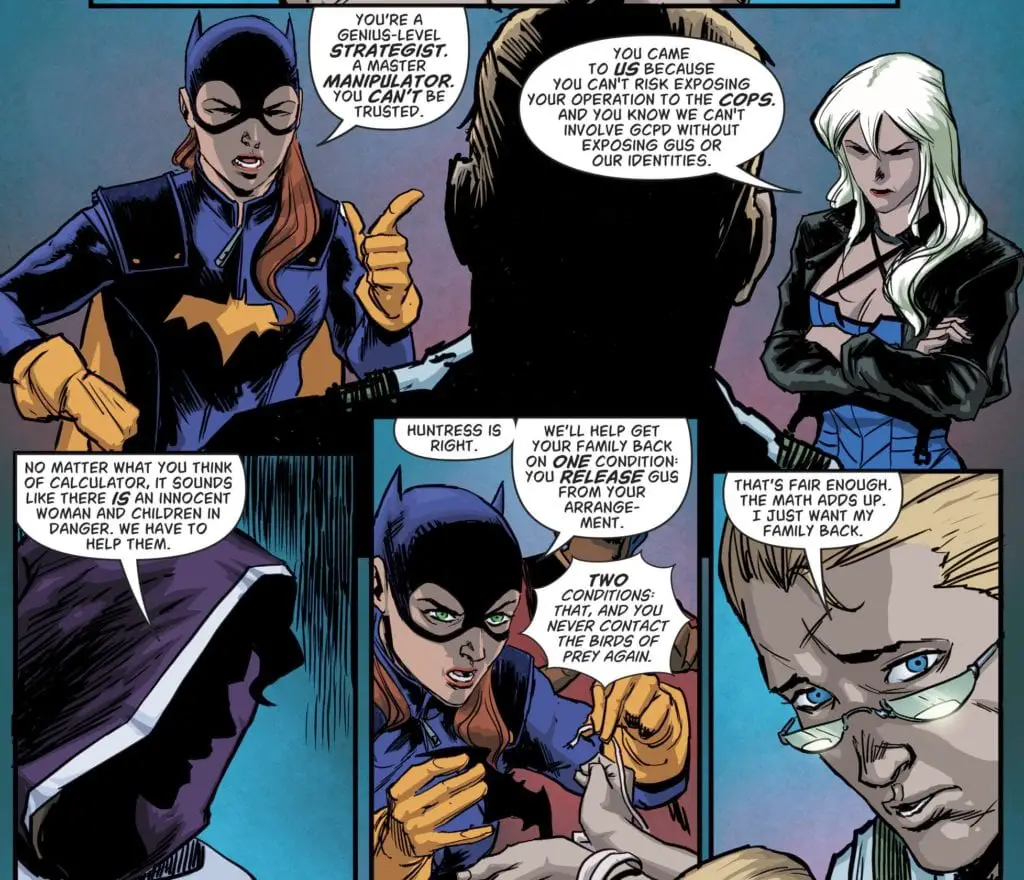
Okay, wow. One, Dinah, you don’t have a secret identity. Two, if he truly cared about his family he’d have gone to the cops. Three, nobody even bothered to double-check to see if he’s telling the truth about his family being held hostage. Four, just because Helena offers a counterpoint based on a supervillain’s testimony, the kind of people she hunted when she was the head of a super-spy organization, doesn’t mean everyone should instantly invert their opinions. Five, Babs has been saying “you can’t be trusted” to so many people she ends up being forced to trust that it’s becoming more about her acting super naive than it is the specific circumstances. Six, it’s the Calculator this is trademark him. If nobody can trace it back to him, then he traced it back to himself, either putting his own family in jeopardy because the math made sense or faking the whole thing.
Also Catwoman and Poison Ivy guest-star in the next issue of Batgirl and the Birds of Prey. Sorta like how Nightwing and Green Arrow guest starred in the last arc, which was not what I would describe as effective. So, look, I apologize, but I think I’m done with this book. I’ll read #12, but unless there’s a miraculous turnaround this is most likely the last review of Batgirl and the Birds of Prey that you’ll see from me. Because, honestly, the implication here, about what Gus’s imagination is like?
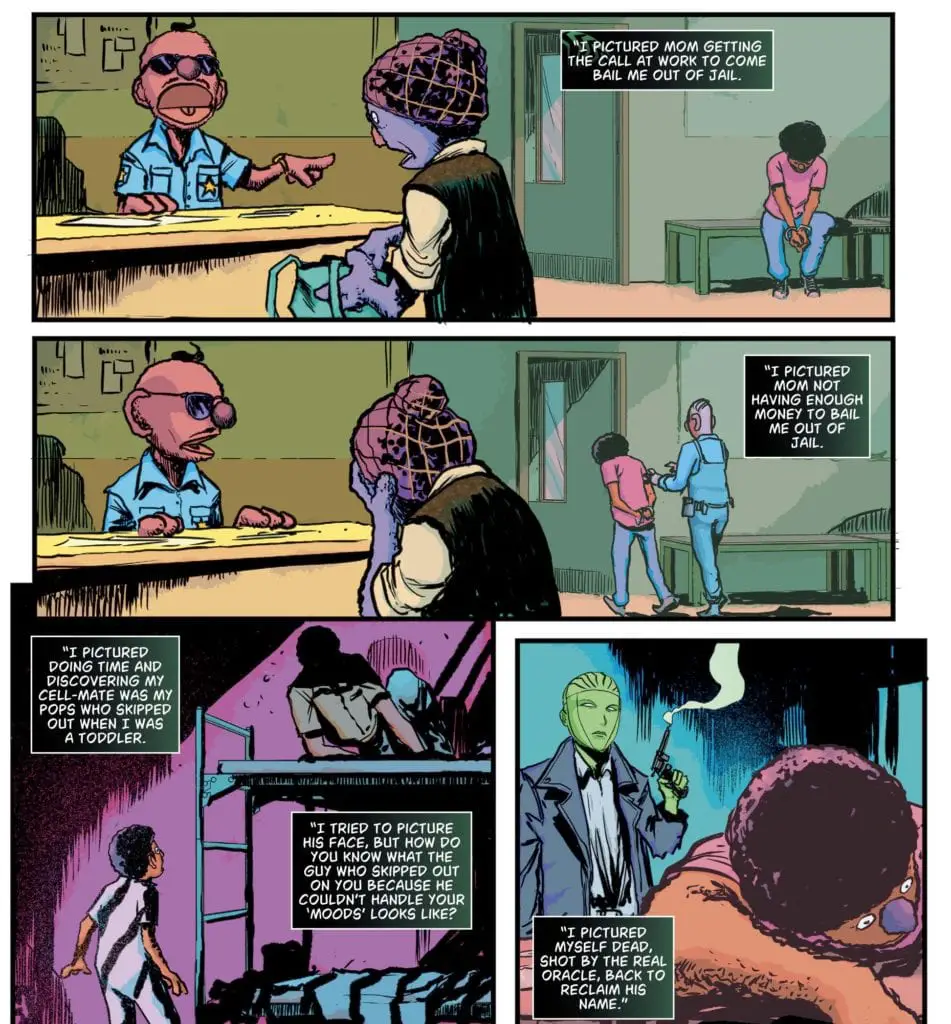
Is this supposed to be Sesame Street? Glove and Boots? Showing us how childish and out of touch with reality Gus is to further push the idea that his “disability” prohibits him from rational, mature and responsible thought? Trying to get us to believe that he is, indeed, “crazy”? I don’t know. I don’t like any of those answers, and honestly…I’m just done. The Bensons had a phenomenal eight-issue run on Birds of Prey, but…I guess it was a fluke. Against all logic, what other explanation is there?
Look, maybe another creative team can swoop in and put the series back on track. Until then, I can’t recommend this book. Somewhere around 40% of Roge Antonio’s panels don’t have backgrounds aside from color gradients. Maybe that’s a scripting problem, maybe that’s just the style, but ultimately there isn’t enough energy or wit in the writing to pick up the slack anymore.
And y’know what the kicker here, is? Even with this script, I’d have still given this a decent score if they’d kept Claire Roe on as the artist. They had a great thing going there for a while. It’s a shame it just…fell apart.
4/10
BATGIRL AND THE BIRDS OF PREY #11
Writers: Julie and Shawna Benson
Pencils/Inks: Roge Antonio
Colors: Allen Passalaqua
Letterer: Josh Reed
Images courtesy of DC Comics


